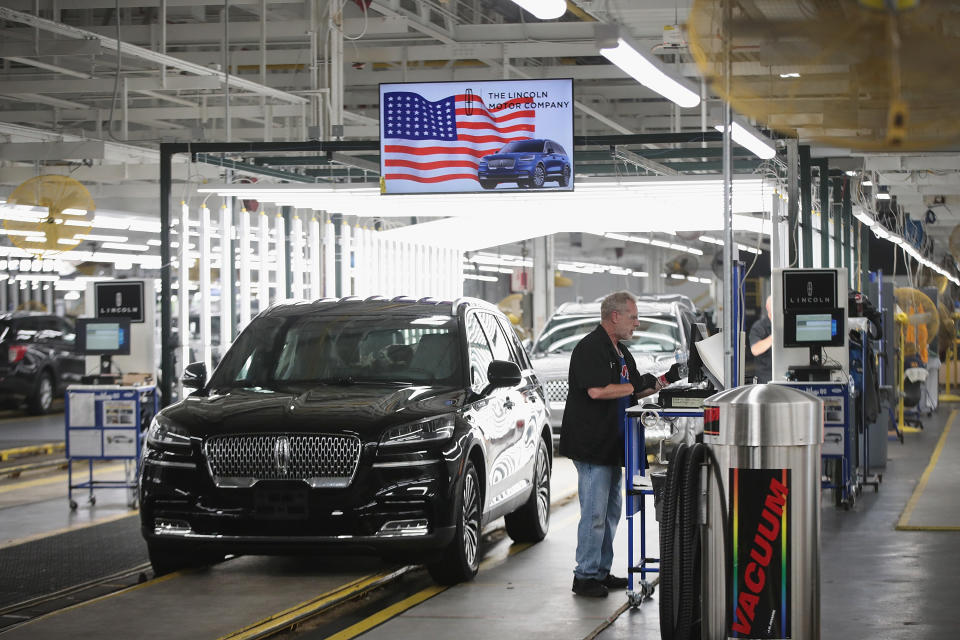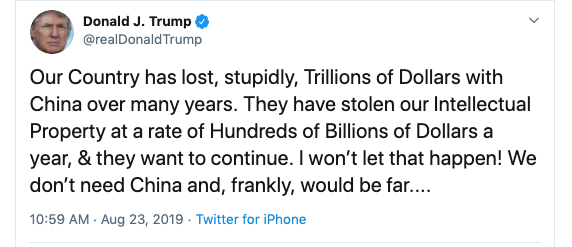US auto and parts makers want swift resolution to US-China trade differences
U.S. auto and auto parts manufacturers are encouraging the U.S. and Chinese governments to work out their differences in response to China’s announcement Friday that it would reinstate 25% tariffs on imported U.S. automobiles and 5% tariffs on imported auto parts, beginning December 15.
China’s commerce ministry unveiled a plan to implement additional tariffs on a total of $75 billion of U.S. goods, part of which will apply to U.S. auto exports. A statement from China’s commerce ministry said a first wave of tariffs ranging from 5% to 10% on 5,078 U.S. products will go into effect on September 1. The effective dates mirror already-scheduled U.S. tariffs on $300 billion worth of Chinese goods, set to begin September 1.
While a series of tweets from President Trump on Friday ordered American companies to seek alternative markets to China and criticized China for failing to curb theft of U.S. intellectual property, auto industry leaders say they prefer a solution that includes continued business with the country.
A spokesperson for Ford Motor Company (FORD), the leading exporter of vehicles assembled in the U.S., told Yahoo Finance that the company is uniquely positioned as a net exporter to China.
“We encourage the U.S. and China to find a near-term resolution on remaining issues through continued negotiations. It is essential for these two important economies to work together to advance balanced and fair trade,” the spokesperson said.

In its second quarter 2019, Ford reported an overall 9% year-over-year decline in wholesales, partially driven by China. The company still managed to narrow its losses in China for the quarter, though. In China, its automotive segment reported a 48% year-over-year increase in consolidated revenue, driven by higher Lincoln volumes, which narrowed EBIT loss to $155 million.
Motor & Equipment Manufacturers Association, a trade organization that represents light and commercial motor vehicle manufacturers and parts manufacturers, which is the largest manufacturing sector in the United States, said it wants a resolution that encompasses intellectual property protection, as well as resumed trade.
“MEMA has repeatedly called for China and the United States to work together to reach a trade agreement that works for both countries,” the organization said. “We ask both parties to resume talks and reach an agreement that will allow U.S. companies to remain competitive in a global marketplace while protecting intellectual property rights.”

The Goodyear Tire & Rubber Company (GT), which manufactures and distributes, tires and other vehicle-related products, worldwide, said it supports free and fair trade.
“We are watching the current trade activity between the United States and China closely and will take actions if necessary to ensure uninterrupted service to our customers,” a company spokesperson told Yahoo Finance.
Goodyear reported softening demand in China in its second quarter earnings, and attributed a 12% decline in original equipment unit volume to lower vehicle production across China and India.
U.S. auto parts exports to China totaled more than $3 billion in 2018, according to Auto Care Association.
“U.S. brands are recognized and highly regarded in international markets,” said Angela Chiang, Auto Care Association’s director of international affairs. “Imposing tariffs on U.S. products and pricing them out of the Chinese markets is the equivalent of lowering tariffs for all other countries and competitors.”
Chinese news outlet Xinhua reported that China will accept applications for exemptions from the duties, details of which the governments would announce at a later date.
Yahoo Finance reached out to General Motors (GM) and did not receive an immediate response.
Fiat Chrysler Automobiles (FCAU) deferred comments to its representative organizations, American Automotive Policy Council and the Alliance of Automobile Manufacturers, from which Yahoo Finance did not receive an immediate response.
Alexis Keenan is a reporter for Yahoo Finance. Follow Alexis on Twitter @alexiskweed.
Read the latest financial and business news from Yahoo Finance
Follow Yahoo Finance on Twitter, Facebook, Instagram, Flipboard, SmartNews, LinkedIn, YouTube, and reddit.

